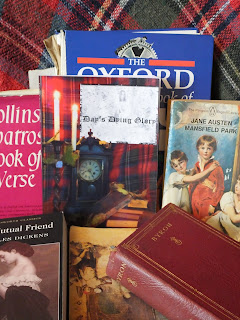Kay Harker and Cole Hawlings Picture accessed via BBC There are few things more Christmassy than the opening few bars of the theme tune to The Box of Delights . In fact, the tune is based on Victor Hely-Hutchinson's Carol Symphony and had been used in radio adaptations of the same novel years earlier than the 1984 television series. Clearly, everyone already knew that you just couldn't improve on that sound to evoke the magic of Christmas which - for me and for many - is so wonderfully explored in John Masefield's story. As a viewer, one of the things I enjoy most about the television series of The Box of Delights is the acting. Child actors are precarious things: too sweet and they're almost unbearable to watch, not sweet enough and they're unbelievable. They must walk that fine line between the two, and it is a perilous one! Most young actors fall into the first category, where their on-screen presence is almost dangerously saccharine. Not so the child actors ...
As an Historical Fiction author, research is paramount. I could write and write and write on this topic! It might come as a bit of a surprise, then,
that I’m about to throw out the crazy suggestion that research is best performed
around the edges of writing a story.
Whatever your story is, make your book about the story first, and then the
research.
 |
| A few books for research and inspiration |
I absolutely love researching things. I love delving into the realms of history
and, if I’m honest, I tend to lose myself there. Despite that, my books stay 100% focused on
the adventures and choices of my characters.
Most things (unless you’re writing in a speculative field) can be
researched to fit in with your story. It
doesn’t matter if you're looking at historic events, geographical phenomena, or
the impact and effects of drugs, you can usually find a way to make the
research fit the story.
Most writers have already done some form of research before
they put pen to paper. After all, you
chose your genre for a reason, so you must have had some previous knowledge or idea
of that topic. My course of action is
usually:
·
get an idea
·
check the general gist and attitude of the time
and place
·
write the story
·
research finer details as I write
This way, I can match my research with my characters, having
them brush shoulders with Wellington, or storm Seringapatam, or both! I am spectacularly proud of the fact readers
commend me on the way in which my books are wholly believable whilst being
intrinsically fictitious.
Here are a few thoughts on research for books:
- It’s your character’s story, not yours. Research as though you’re your character. See things through their eyes and not with our 20:20 hindsight and understanding.
- It’s all about the story. You should be able to tell your family/friend/neighbour the outline of your plot without ever having to reference how much research you’ve done. The research should just enhance your story, not dominate it.
- You’re not writing a textbook (unless you are, in which case: ignore this point!). Don’t throw in so much detail that your readers feel they’re about to be made to sit an exam on the subject. Slotting in samples of research, dotting them throughout a book, allows your reader to be immersed in your research and knowledge without feeling intimidated by it.
- There is no such thing as too much research, only poor inclusion of said research. The more you know, the better the flow! Extensive research allows your world and characters to feel tangible and sympathetic, both things which are central to effective writing.
Comments
Post a Comment